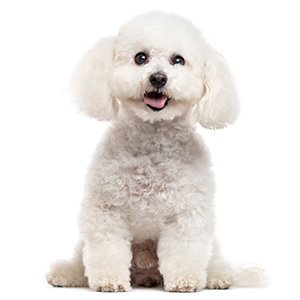Are Bichon Frises Good For Apartments?
Are you living in an apartment unit or flat and considering to get a Bichon Frise and need to know whether a Bichon Frise Dog is suitable for your apartment?
Well, Bichon Frise scores  out of 5 in the scale of apartment friendly dogs when it comes to other dog breeds.
out of 5 in the scale of apartment friendly dogs when it comes to other dog breeds.
Can Bichon Frises Be Apartment Dogs?
-
The Bichon Frise can live in an apartment if it gets enough exercise. They are fairly active indoors and will do okay without a yard.
Top 5 Apartment-Friendly Dog Breeds
Personality, bark-levels and a low-energy count are all great qualities to search for when on the hunt for an appropriate apartment canine. Below is a list of the best apartment frinedly breeds.
1. English Bulldog - Despite appearances, the English Bulldog is a cheery dog that is more than happy to spend their days sleeping on the couch. They will barely bark, and are great with children in spite of their stocky build which has them weighing upwards of 22kg!
2. Pug - Love them or hate them, the humble pug is a lively and faithful dog. Pugs are a social breed, so their perfect home would involve another pet or plenty of human interaction. The pug is satisfied to laze about all day, making him the perfect apartment buddy.
3. Chihuahua - While the Chihuahua needs minimal exercise, making it perfect for a smaller home, it is very essential that they receive proper training to avoid the yappy personality they are known for. Weighing as little as 1kg, they are effortlessly carried around which is handy for individuals who travel.
4. Dachshund - Also known as the 'sausage dog', this friendly breed is very good with other pets and children. While they can at first be somewhat difficult to train, they only need a small amount of exercise, due to their tiny legs!
5. Boston Terrier - Another breed perfect due to their size, the Boston Terrier will call for a daily walk to stay pleased, but they can be wonderful, affectionate breed who will remain mostly inactive while indoors.
What to do if you lose your Bichon Frise
If your Bichon Frise Dog or any other pet has gone missing and it does not have an identification tag with a phone number, you can:
1. Report your missing pet details at Pet Reunite website here.
2. List the missing pet on the Local Facebook Lost Pets Groups Here.
3. Call the nearby vets to see if anyone has handed in your lost pet.
4. Phone the RSPCA or Visit the RSPCA Lost Pets website and complete a Lost Pet Report.
5. Visit Lost Pets Pages of Animal Shelters.
What to do if you find a lost Bichon Frise
If you find a Bichon Frise Dog or any other pet and it does not have an identification tag with a phone number, you can:
1. List the found pet details at Pet Reunite website here.
2. Report the missing pet on the Local Facebook Lost Pets Groups.
3. Call the Local Authority to collect the lost animal.
4. Take the pet to the local Animal Shelter assigned to your suburb.
5. Take the animal to the local Vet who usually scan the animal’s microchip and phone the registered pet owner.
Laws Regarding Missing Pets
1. It is against the law to keep any animal that you find.
2. Pets are generally considered property and it is illegal to take and keep someone else’s property.
3. You must call your local animal control unit and file a FOUND AN ANIMAL report for any dog or cat you find.
4. To reclaim your lost dog, cat or other pet from the animal shelter you must pay a release fee.
5. If your dog or cat is unregistered, you will have to register your pet before you can take it home.

